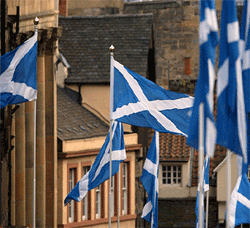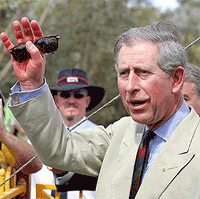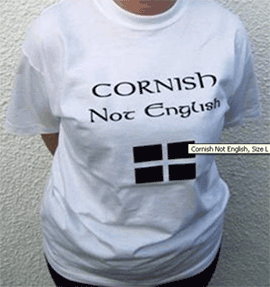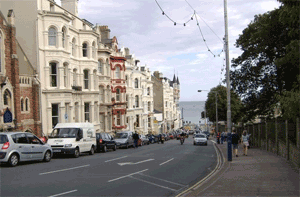Breaking for the Border - Part 2
31st Mar 2008
Breaking for the Border - Part 2
Finbarr Barry
Revolutionary struggle for independence is not confined to the Rebel County, here
are some updates on how some of our Celtic brothers are faring against their oppressors…
Scotland
Population: 5,00,000
Size: 32,000 sq. kms
Capital: Edinburgh
 |
When your fellow countryman (Gordon Brown) is prime minister of the state you're actually trying to gain independence from it does tend to deflate your case for cessation a bit. Maps and borders aside, the Scots have managed to maintain a distinct identity (despite only 60,000 people who understand Gallic) with their own parliament in Edinburgh enjoying a considerable degree of Home Rule whilst still sheltering under the military might of Great Britain.
Englishmen could
be forgiven for considering them rude - the Scots only signed up to the Union
in the 1700's and are already looking for the exit door. For many years, despite
the managerial successes of Scottish soccer managers in England the national
team has enjoyed little more than misery and embarrassment.
The rugby
team hasn't done much better - their regular Six Nations pasting does little
for national confidence so you might excuse outsiders for thinking that their
sporting failures, bitter weather and unintelligible accents might fuel distain
for the warmer climes of London and its glinting history of World Cups.
Prospects for Independence: Since Gordon Brown replaced Tony Blair, Scots haven't been feeling so bad about the "old enemy" as recent polls show less people are now interested in total independence than was previously thought - as low as 21% according to some sources.
Lesson for Cork: If Michael Martin or Simon Coveney ever become Taoiseach of the Irish Republic, we may have to sideline a democratic referendum and go for a straight-up all-guns-blazing revolutionary coup instead.
 |
Wales
Population: 3 million
Area: 20,000 sq. kms
Capital: Cardiff
Land of miners and hairy rugby players, Wales has considerably piped down about independence in the last few years now that, like the Scots, they've got their own parliament, although this is dumbed down somewhat with its title of "National Assembly" - which sounds little more than a large gathering of people in a school gymnasium.
Without as much authority as their Celtic cousins to the north, the Welsh are subjected to more laws passed in the House of Commons, but are not as traditionally and ethnically divided by religion (Celtic V Rangers) allowing for a more cohesive national identity. Of all the Celtic peoples the Welsh have been the most successful at promoting their language with 25% of the population using it in everyday conversation.
Prospects for Independence: Polls show that Taffy is happy with the Union and movements to put border checkpoints on the Severn Bridge receive little interest.
Lesson for Cork: Its time to get Cork slang recognised as an official language of the EU.
Cornwall
Population: one Pairc Úi Chaoimh load of people more than Cork's
Size: half the size of County Cork
Capital: Truro
 |
In fact Cornwall is not a 'county' as most of the English would believe, but a 'duchy' - a sort of royal back garden that in theory is an autonomous state. Up until medieval times, Cornwall (or Kernow as the Cornish know it) actually was a separate country with its own Celtic language.
In more recent times, the Cornish-Not-English campaign has taken high profile cases challenging English authority in the region and is trying to revive the language with free classes and a large merchandising campaign centred around black flags with white crosses, their 'national' flag.
Our Cornish comrades are anxious to align themselves with their Celtic brethren. In 2001 Cornwall County Council published a report that over 34,000 people identified themselves as ethnically Cornish in a 2001 census.
Following this,
the separatists delivered a petition for Scottish-like independence with an
impressive 50,000 signatures which turned a few heads in London and gave Mebyon
Kernow, the movement's political party, some fresh impetus in their campaign
for Home Rule.
Check out:www.cornishnotenglish.com
for more interesting shenanigans.
Prospects for Independence: Long term and not popular among the young but showing signs of promise.
Lesson for Cork: time for the Cornish pasty and Cork drisheen to join forces!
 |
The Isle of
Man
Population: 80,000
Size: 557 sq. kms
Capital: Douglas
Bizarrely enough
the small island nation, which clearly took its name from the Cork suburb, is
neither part of the E.U. nor the United Kingdom and instead pledges its loyalty
solely to the Queen of England aka The Lord of Mann. In return for singing her
national anthem and paying some tax, the Queen grants British citizenship and
military protection to the Manx people.
The island,
known for its famous Manx Motorcycle Grand Prix, has avoided invasions and general
interference with great aplomb, possibly a testament to its population who are
not known for their ceád mile failte despite the Gaelic blood.
Despite the death of the last native Manx speaker in 1974, a new language revival has begun and the island's only Gaelscoil has started to churn out new young speakers of the language.
Prospects for Independence: they've pretty much done the job already but like the principality of Lichtenstein they've outsourced defensive duties to Mrs. Windsor. They've got one of the oldest "parliaments" in the world and sit pretty between England, Scotland, Northern Ireland, the Republic and Wales which keeps their economy ticking over nicely.
Lesson for Cork: although it would mean enforcing long faces by law, we do have the option of scowling at everyone who comes to the county to make our cessation more tolerable to them. You have to feel for the Manx though. If you had ferry loads of Dublin scobes arriving for a weekend's boozing you'd be in poor form too.
-----------------------------------------------------------------------
* Population of
County Cork (2006): 481,000
* Area of Cork: 7,457 sq. kms.































